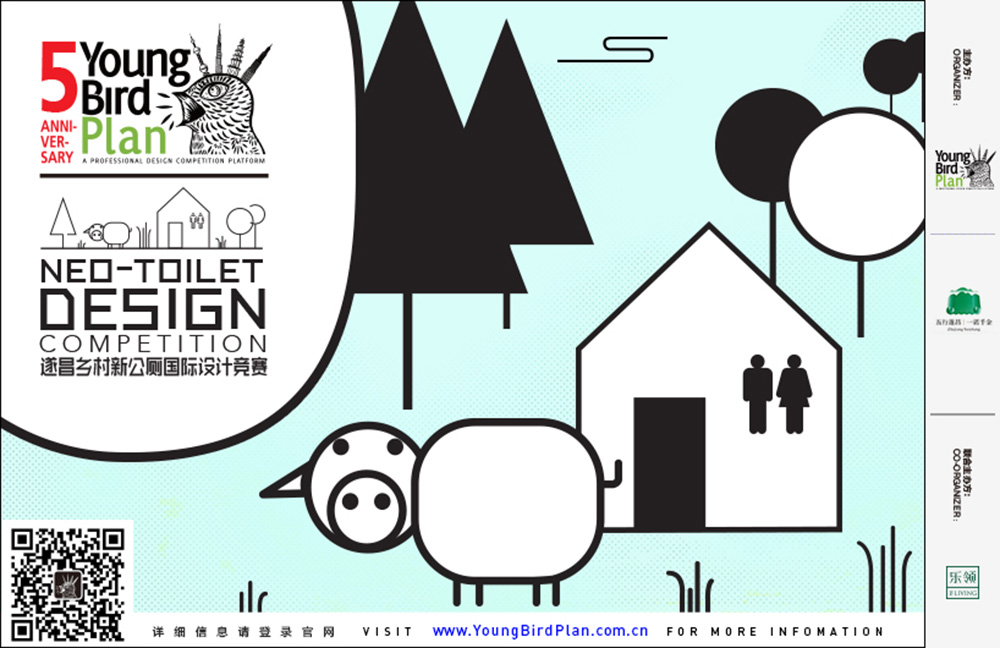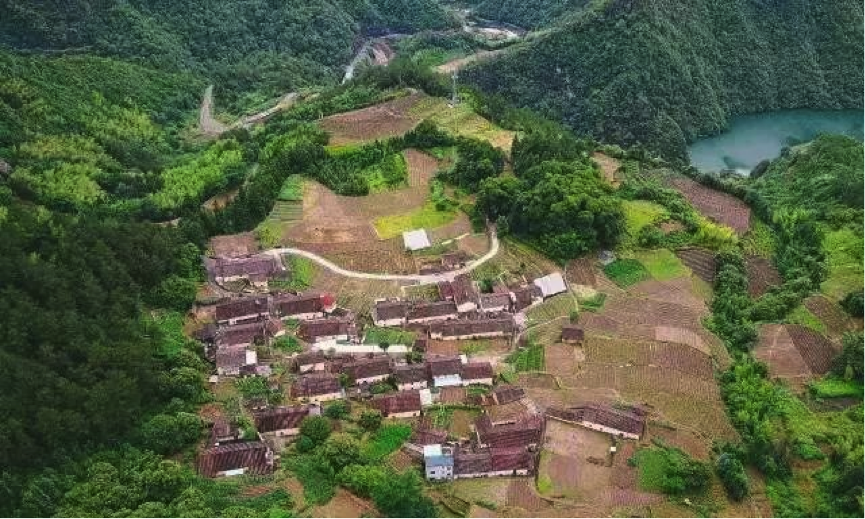Submitted by WA Contents
International Competition: "Neo-toilet Design Competition" in China
China Architecture News - May 14, 2018 - 06:21 20788 views

Young Bird Plan, a global design competition organization based in Shanghai, has announced a new competition for "public toilets". The competition aims to create "Public Toilets Revolution" in Suichang, Zhejiang Province, China, by building top 5 winners.
One of the main criteria to assess the degree of a city or a village’s civilization is the condition of local toilets. Since 2015, Chinese “Toilet revolution” has spread from tourist attractions to the whole nation, from the cities to the rural area, setting a shining example of positive contributions to developing a beautiful and healthy country. But more efforts still need to be put into this massive undertaking due to our vast territory.
Hence, in response to the appeal of “Toilet revolution”, Suichang People’s Government, Young Bird Plan and LeLiving launch 2018 Suichang “Neo-Toilet” International Design Competition, with the aim of making contributions to livelihood projects. This competition is committed to boosting the development of tourism and revitalizing villages in this new age by focusing on the small facet of our life. The schemes of Top 5 finalists will be modified and constructed under the charge of the co-organizer, LeLiving and organizer, Suichang People’s Government.

Qishan, the place of reclusion
This project is located in Suichang, Zhejiang Province. Known as "a retreat away from the modern world", Suichang is a beautiful county with 1,800-year history surrounded by mountains. In the late Tang Dynasty, Monk Guan Xiu had dwelled in Suichang Tangshan in seclusion and peace for over 14 years, painting pictures of 16 arhats. During 1593-1598, this poetic place saw Tang Xianzu, a master in literature and drama, penned the most memorable jewel, The Peony Pavilion. It boasts charming landscape, rich resources and various attractions, such as Suichang Gold Mine National Mine Park, Nanjian Rock, Qianfo Mountain, Shenlong Valley, Hongxingping Hot Spring, Zhutan Museum, Baima Mountain and Jiulong Mountain.
A diversity of culture merge in Suichang, including Haochuan Culture, Tang Xianzu Culture, Red Culture and Folk Culture. Backed by the advantaged nature resources and cultural background, Suichang adheres to the principle of green development, the strategy of building county of tourism and leisure in Yangtze River Delta. It has already invented a tourism-centered path and integrated various industries, establishing its eco-friendly brand image and reputation.

Aerial view of the whole tea plantation
This village had been descended into a backward area with only some ten households of the elderly because young people out-migrated for work. In June 2017, Suichang government initiated this project in collaboration with LeLiving. By renovating disused houses and local industries, this attempt is conducive to increase local job opportunities and motivate villagers to take part in the rural development. At length, as an illuminating example of poverty alleviation, cultural and environmental protection, it will help people rediscover the unspoiled beauty in the rural area whilst improving the quality of local life.
This design competition launched by Suichang County is an attempt to ignite the transformation of regional cultural tourism. Toilet is the cornerstone of urban and rural civilization. As a landscape decorated in the picturesque setting and a nice surprise for visitors, a new toilet will improve local tourist environment and subtly elevate the quality of villagers’ life. What’s more, it will be a mirror of LeLiving Villa’s poetic scenery, rural-living concepts and knightly spirits.
This competition features two procedures for picking winners, namely, jurors’ selection and mentor’s guidance, in order to comprehensively evaluate the entries in this competition. To ensure the equality, the interdisciplinary jury panel consists of Wenhua Zhang, Director of Administrative Committee of Suichang Provincial-level Tourist Resort, Member of Suichang Party Working Committee and Senior engineer; Qigen Luo, Village representative; Changjiang Yu, Associate professor at Peking University; Ning Ou, Director & Publisher; Jiujiu Hu, Writer & Cultural elite; Lei Luo, Founder of Shenzhen LeLiving Development Co., Ltd.; Isa Ye, Founder & CEO of Young Bird Plan.
Jury members

Mentor

James Wei Ke received his B. Arch. and M. Arch. Degree from University of California, Berkeley and Columbia University with the help of his tutor Kenneth Frampton. He established Chiasmus in New York and relocated it to Beijing in 2010. With over ten-year experience in famous architectural firms and different renowned universities and colleges, including Columbia University, New York Institute of Technology, and Tongji University, he has worked in multi-disciplinary sectors, such as publication, education, research and practice. At the age of 29, he took charge of the conceptual design of Washington Newseum. When he was 36, he directed the design of Incheon Arts Center. His remarkable projects and theses issued on a variety of leading academic publications prove that he is a successful architect of cultural projects around the world.
Mentor’s responsibilities: Each of Top 5 winners will have a chance to communicate with the mentor, and their works will be optimized and fabricated under the guidance of him.
Design
Entrants are required to think out of the box and design a 15-30-square-metre public toilet with the height of 3 meters in the tea plantation in Suichang County, based on hygienic, convenient, safe and energy-saving principles. Besides, management room for cleaning and management should be included. This user-centered toilet should speak for local culture, serving as a building icon that harmonizes with surrounding landscape.
Culture-respecting
Careful consideration and flexible use of the physical geography, location, resources, convention of the site; deep understanding of LeLiving culture; innovative reflection of local uniqueness (culture and custom).
Characteristic
The toilet should be hygienic and convenient. The surrounding facilities, local features, techniques, and materials should be considered when designing, to improve the image of village and boost tourism. The scheme should be rural in character whilst satisfying the healthy and hygienic needs of modern life, with the aim of building a new countryside.
Eco-friendly
Taking “energy-efficient, land-saving, green” as goals, it should give priority to ecological features and people’s livelihood. The position of toilet and the approach to feces disposal should be considered based on labor-saving principle. The construction of toilet and eco-village should be integrated with the development of industry, and driven by policy and the public’s support. The object is to build a public toilet where is applied with suitable energy-saving technology and green materials, and to meet the habits of villagers and visitors.
Practicable
Toilet is the most basic facility of infrastructure. Local common materials, techniques and their cost need to be considered when designing. The scheme should be practicable, functional and aesthetic.
Details
1. A scheme shall be presented in two A2 sheets in a clear, vertical way and in readable format (with a 10mm page margin) and include following parts:
-Descriptive text no longer than 300 English words (except notes);
-Registration No. shall be put in the upper right corner of the sheets, in Arial 20pt font;
-A scheme shall contain plans, elevations, bird view, concept evolution, concept analysis diagrams, and renderings for different spaces; other details;
2. A maximum of two A2 sheets in JPG format (no larger than 20MB for each) can be submitted.
3. A scheme title shall contain no more than 4 English words in the “registration No. – scheme title – sheet No.1/No.2” format.
4. A scheme shall be in bilingual (for Chinese-speaking entrants) or English (for English-speaking entrants).
5. The two A2 sheets and the explanatory text shall be submitted separately in the correct places on the website.
6. Please do not compress your files.
7. Cover must be uploaded in the size of 4:3, less than 500 KB.
This competition is open to designers, students and design enthusiasts of all ages with design-and art-related background across the world. Each group (two members at most) shall submit no more than two entries.
Competition schedule
Call for Entries: April 9, 2018
Registration Deadline: May 25, 2018
Submission Deadline: May 30, 2018
Release of Top 100: June 15, 2018
Release of Top 30: June 22, 2018
Selection and Release of Top 10: June 29, 2018
Release of Top 5: June 30, 2018
Top 5 attending Opening Ceremony of tea plantation: 2018 (to be confirmed)
Registration
Please register by logging into the competition's website.
The competition is free to entry.
For the latest information about this competition, please follow our official WeChat account youngbirdplan-cn or our official Weibo account @YoungBirdPlan; or you can directly contact the competition team by add YoungBirdPlan as one of your Wechat friends. We remain at your service here for any further questions you may have.
Please download the information kit on the competition website or by this link: https://pan.baidu.com/s/1CBNs4W68pm-Bs9t-9_6DUA & https://pan.baidu.com/s/1CBNs4W68pm-Bs9t-9_6DUA
Awards
Top 2 projects will be constructed by the co-organizer, LeLiving in the village; Top 5 projects will be built by Suichang People’s Government in Suichang county.
- First Prize: 1 winner; 30,000 RMB (pre-tax; no overlap with the other Top 5 prizes) and Certificate of Award.
Top 5 (Except first prize): 4 winners; 10,000 RMB (pre-tax) and Certificate of Award.
- 5 entrants who receive the most votes during the public voting process on YoungBirdPlan website will win the Certificate of People’s Choice Award.
- School-level champions will be awarded certificate of Award and recommended to work in famous design institutes.
- Each of Top 100 will be awarded Certificate of Award, a publication by Young Bird Plan, and the opportunity to be published on YoungBirdPlan website and publication..
- All selected participants will be awarded certificates.
All images courtesy of Young Bird Plan
> via Young Bird Plan
